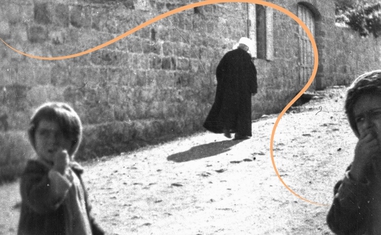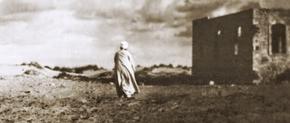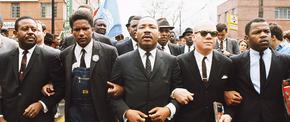The views expressed in our content reflect individual perspectives and do not represent the authoritative views of the Baha'i Faith.
Abdu’l-Baha was always very mindful of how to help and care for others who were poor, sick, or underprivileged and in need for assistance. Even during the years of his imprisonment in Akka he often gave his own bed to others who did not have one. As we are in a time of a pandemic crisis ourselves, I wondered what Abdu’l-Baha would be doing were he with us today.
Abdu’l Baha: The Essence of Servitude and Simplicity
The following anecdote from Lady Blomfield’s book, “The Chosen Highway,” might shed some light on an answer: “[T]here was a poor and crippled woman named Na’um who used to come to Abdu’l-Baha every week for a gift of money. One day a man came running: “O Master!” he said, “Poor Na’um has the measles, and everybody is keeping away from her. What can be done?” Abdu’l-Baha immediately sent a woman to take care of her; He rented a room, put His own bedding in it, called the doctor sent food and everything she needed. He went to see that she had every attention. And when she died in peace and comfort, He arranged a simple funeral and paid all the expenses Himself.”
Such acts are today witnessed among the thousands of health professionals who risk their lives to care for and save the lives of their fellow human beings.
RELATED: Who Is Abdul-Baha and Why Is His Station Significant?
Abdu’l-Baha lived a very simple life. Mirza Mahmud-i-Zarqani, his secretary during Abdu’l-Baha’s journey to the West, chronicled Abdu’l-Baha’s generosity when it came to assisting the sick, the poor, and those in distress as well as spending on whatever would uphold the dignity of the Faith. However, Abdu’l-Baha himself did not own a good winter coat.
As Balyuzi recounts in “Abdu’l-Baha,” his companions had to beg him over and over for permission to buy him a new coat. He ate very simple meals and was detached from material wealth and vanity. In his book “239 Days Abdu’l-Baha’s Journey in America,” author Allan Ward tells how during Abdu’l-Baha’s travels in the United States in 1912, the Baha’i friends made every effort to convince him to accept money from them, but He declined their offer, advising them to distribute it among the poor.
In his service to humanity, Abdu’l-Baha sacrificed comfort and rest and would even give away his own food or clothes. Juliet Thompson wrote about how when Abdu’l-Baha was in prison in Akka, Israel, he would nurse with his own hands the sick and dying prisoners.
Life was extremely difficult at the beginning of His imprisonment. The room given to Abdu’l-Baha on the ground floor of the prison had previously been used as a morgue. The intense heat during the day and the humidity of the air adversely affected the Master’s health for the rest of His life. In his book “The Child of the Covenant,” Adib Taherzadeh described how the filthy conditions in which the prisoners lived with its severe restrictions and lack of proper food and hygiene took their toll. Despite all this misery and suffering, Abdu’l-Baha kept his composure, remaining serene and happy. Such an attitude is reminiscent of a statement from Helen Keller, a prominent American: “Keep your face to the sun and you will never see shadows”.
The abundant and often daily services rendered by Abdu’l-Baha were not only offered to the Baha’i community, but also to the inhabitants of Akka and Haifa in general. In Lady Blomfield’s book, “The Chosen Highway,” one of his daughters described Abdu’l-Baha’s life, after Baha’u’llah had moved to Bahji, as follows: “The life of the Master in ‘Akka was full of work for others’ good. He would rise very early, take tea, then go forth to His self-imposed labours of love. Often He would return very late in the evening, having had no rest and no food…The Arabs called Him the ‘Lord of Generosity’…”
When World War I broke out, after having lived 55 years in exile and/or in prison, Abdu’l-Baha’s life was threatened by the Turkish Government and he once again become virtually a prisoner of that oppressive government. During the war, Abdu’l-Baha kept busy attending to the needs of the people around Him. Author J.E. Esslemont wrote in “Baha’u’llah and the New Era” that Abdu’l-Baha “personally organized extensive agricultural operations near Tiberias, thus securing a great supply of wheat, by means of which famine was averted, not only for the Bahá’ís but for hundreds of the poor of all religions in Haifa and ’Akká, whose wants He liberally supplied. He took care of all, and mitigated their sufferings as far as possible.”
In her book “Vignettes from the Life of ‘Abdu’l-Bahá,” Annamarie Honnold wrote that when Lua Getsinger was in “Akká to see the Master one day, ‘He said to her that He was too busy today to call upon a friend of His who was very ill and poor and He wished her to go in His place. Take him food and care for him as I have been doing, He concluded. He told her where this man was to be found and she went gladly, proud that ‘Abdu’l-Bahá should trust her with this mission.
‘She returned quickly. “Master,” she exclaimed, “surely you cannot realize to what a terrible place you sent me. I almost fainted from the terrible stench, the filthy rooms, the degrading condition of that man and his house. I fled lest I contract some terrible disease.”
‘Sadly and sternly ‘Abdu’l-Bahá regarded her. “Dost thou desire to serve God,” He said, “serve thy fellow man for in him dost thou see the image and likeness of God.” He told her to go back to the man’s house. If it is filthy, she should clean it; if this brother of yours is dirty, bathe him; if he is hungry, feed him. Many times had He done this for him and cannot she serve him once?”
This experience transformed Lua’s perception of caring for those who are sick and suffering and in need of compassionate care. She also recognized the depth of the Master’s love and servitude for those who are poor and destitute.
Abdu’l-Baha as the Embodiment of Humility
In his Tablet of Visitation, Abdu’l-Baha prays to God to help him to be “selfless” and “detached” from all things. He furthermore expresses his longing and supplication for lowliness and servitude saying, “Lord! Give me to drink from the chalice of selflessness; with its robe clothe me, and in its ocean immerse me.”
His profound longing for lowliness intensifies in the following sentence of that prayer where he pleads, “Make me as dust in the pathway of Thy loved ones and grant that I may offer up my soul for the earth enabled by the footsteps of Thy chosen ones in Thy path.”
These soul-stirring words express an utmost selflessness, submission to the Will of God, complete detachment and absolute humility. He chooses the lowliest station of servitude and expresses a deep desire to devote His service to the believers and to all humanity. With these words, wrote Shoghi Effendi, Abdu’l-Baha defines the reality of “the embodiment of every Baha’i ideal.”
This prayer calls to mind the significance of Abdu’l-Baha as the “Exemplar” which resonates in His words, quoted in “Star of the West, vol. VIII” addressing Baha’is everywhere calling them to “look at Me, follow Me, be as I am.”
RELATED: When Abdu’l-Baha Left This World
In one of his tablets, Abdu’l-Baha stated that the highest degree of sacrifice for a believer in the path of God is to surrender his will to the will of God and become a true servant of the followers of Baha’u’llah. Taherzadeh explained in “The Revelation of Baha’u’llah, Vol. 3” that as God is exalted above the servitude of men, believers should express their servitude by offering their service to His believers as Abdu’l-Baha, who considered himself as the lowliest servant of the loved ones, did.
What Can the West Learn From Abdu’l-Baha’s Servitude and Humility?
Juliet Thompson, in her book, “Abdu’l-Baha, the Centre of the Covenant,” gives a wonderful metaphor for the role of a servant of God. She states that the heart is the servant of the living body. The highest function of the heart is to be the channel of life and divine love. Then she says that Abdu’l-Baha’s last words to the believers in his Will and Testament are concerned with the mystery of love as a motivating force for servitude. If we apply this example to the body of the Baha’i community, we could say that Abdu’l-Baha’s servitude acted like a heart to channel divine love to all humanity. His words and example transmitted the lifeblood of the Baha’i revelation, which is love of God and unity, to the entire Baha’i community and to Baha’i institutions around the world.
Abdu’l-Baha’s visit to the West must have challenged many Westerners due to his simplicity, modesty, and exemplary sense of humility. His journey to America coincided with the emergence of the Industrial Revolution when individualism and a materialistic way of life were on the rise. Today consumerism dominates our perception of the true meaning and purpose of life. Children are taught to be more competitive, to strive and become superior to others, to have more power, to acquire more material goods, and to be less empathic to the plight of the poor.
The Baha’i teachings aim to reverse this process. In this materialistic and self-worshipping world, there are countless people who are indeed bond-slaves to self-interest, indulgence, and the vanities of the material world. Abdu’l-Baha’s life offers an example of how a spirit of humility and utter nothingness can free humanity from such chains.
Taherzadeh wrote in “The Covenant of Baha’u’llah” that Abdu’l-Baha had an immense dislike of being photographed saying that “…to have a picture of oneself is to emphasize the personality.”
In his trip to the West during the first few days of his visit to London “He refused to be photographed.” However, the newspaper reporters needed a photograph of him and put pressure on the Baha’is to take his picture. The Baha’is persistently beseeched him until he finally allowed his picture to be taken in order to make them happy. His kind heart went out to the reporters who might have lost their jobs if there was no picture with their report!
Abdu’l-Baha’s loving generosity and magnanimity extended to everyone, whether poor and utterly unknown or famous. One of the stories from “Vignettes from the Life of Abdu’l-Baha,” recounts how upon Abdu’l-Baha’s passing, E.G. Browne, the renowned Cambridge scholar, and orientalist wrote an article about him in the Journal of the Royal Asiatic Society.
Browne stated that Abdu’l-Baha “probably exercised a greater influence not only in the Orient but in the Occident than any Asiatic thinker and teacher of recent times…” He furthermore remarked that one of the most important practical results of Baha’i teaching in the United States was “the establishment in Baha’i circles in New York of a real fraternity between black and white, and an unprecedented lifting of the ‘color bar’…”
Abdu’l-Baha had an immense sense of empathy for the plight of the Black people who suffered discrimination and denigration because of the color of their skin. During his journey to the West, He made it clear that racial prejudices must be abolished, equality of rights be respected, and social justice established.
Honnold also wrote about how while in Paris, Abdu’l-Baha stayed in a hotel where “among those who often came to see Him was a poor, black man. He was not a Bahá’í, but he loved the Master very much. One day when he came to visit, someone told him that the management did not like to have him – a poor black man – come, because it was not consistent with the standards of the hotel. The poor man went away. When ‘Abdu’l-Bahá learned of this, He sent for the man responsible. He told him that he must find His friend. He was not happy that he should have been turned away. ‘Abdu’l-Bahá said, ‘I did not come to see expensive hotels or furnishings, but to meet My friends. I did not come to Paris to conform to the customs of Paris, but to establish the standard of Bahá’u’lláh.’”

















Comments
Sign in or create an account
Continue with Facebookor